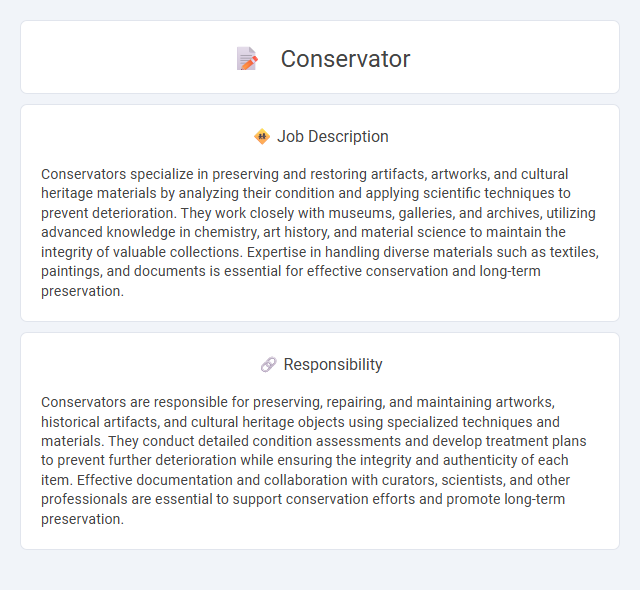
Conservators specialize in preserving and restoring artifacts, artworks, and cultural heritage materials by analyzing their condition and applying scientific techniques to prevent deterioration. They work closely with museums, galleries, and archives, utilizing advanced knowledge in chemistry, art history, and material science to maintain the integrity of valuable collections. Expertise in handling diverse materials such as textiles, paintings, and documents is essential for effective conservation and long-term preservation.
Individuals with strong attention to detail and a passion for preserving historical artifacts are likely to excel as conservators. Those who prefer hands-on, meticulous work and have patience for long-term projects may find this career highly suitable. However, people who struggle with precision or lack interest in conservation science might find this role challenging.
Qualification
Conservators typically require a master's degree in conservation, art history, chemistry, or a related field, emphasizing specialized training in preservation techniques. Proficiency in scientific analysis, materials science, and hands-on restoration skills is essential for assessing and treating cultural artifacts. Practical experience gained through internships, apprenticeships, or museum work enhances a conservator's ability to maintain and restore delicate objects accurately.
Responsibility
Conservators are responsible for preserving, repairing, and maintaining artworks, historical artifacts, and cultural heritage objects using specialized techniques and materials. They conduct detailed condition assessments and develop treatment plans to prevent further deterioration while ensuring the integrity and authenticity of each item. Effective documentation and collaboration with curators, scientists, and other professionals are essential to support conservation efforts and promote long-term preservation.
Benefit
Conservator jobs likely offer the benefit of preserving valuable art, historical artifacts, or cultural heritage, which can provide a strong sense of purpose and fulfillment. The role probably includes opportunities for professional development through specialized training and exposure to diverse materials and techniques. Benefits may also encompass a stable salary and potential access to work in prestigious museums, galleries, or institutions.
Challenge
The role of a conservator likely involves managing complex restoration challenges that require a deep understanding of materials and historical contexts. They probably face the difficulty of preserving delicate artifacts while preventing further deterioration. Balancing authenticity with modern conservation techniques might be a frequent and demanding challenge in their work.
Career Advancement
Conservators specializing in art, historical artifacts, or natural resources can advance their careers by gaining expertise in specialized restoration techniques and obtaining certifications from recognized conservation organizations. Pursuing advanced degrees in conservation science or museum studies enhances job prospects and opens opportunities for leadership roles, such as chief conservator or museum director. Networking within professional associations and presenting research at conferences further accelerates career growth and recognition in the conservation field.
 kuljobs.com
kuljobs.com